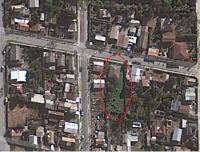Home buying guide Buying a home is a very difficult undertaking, whether the buyer wants to make a buy-to-let investment or purchase the home of a lifetime. There are many items that should be taken into account in order to make a sound and value-for-money investment. Buying a home implies big ex ...
Buying a home
Home buying guide
Buying a home is a very difficult undertaking, whether the buyer wants to make a buy-to-let investment or purchase the home of a lifetime. There are many items that should be taken into account in order to make a sound and value-for-money investment. Buying a home implies big expenses, which include the house price, maintenance costs and taxes.
Home buyers should make a far-sighted investment and look for the house where they believe they can live for many years and that can be adapted to the changing needs of the family. Homes must remain functional as time goes by.
When purchasing a home, it is advisable to look for the house type that best satifies the wishes of the buyer according to his/her lifestyle and that is located in the right surroundings. A condo can be suitable for those who have a lock-and-leave lifestyle, while a single-family home is the best choice for those seeking privacy.
The price required for the purchase of a home should never overcome the budget the buyer has at his/her disposal. It is absolutely advisable to buy what one can afford – not only in terms of price, but also in terms of mortgage payments and maintenance costs – in order to be able to tackle with possible unexpected financial problems that may arise. A buyer should also be aware of how much he/she can afford to borrow, when asking for a mortgage.
Home buyers should not take into account newly-built homes exclusively. They should also consider old houses that home owners have renovated or upgraded, as they may offer some features new homes do not have.
The process for buying a home may be tricky; therefore, it is advisable not to rish into it. Buyers should take their time to visit as many properties for sale as they can and to evaluate several investment opportunities in order to make a smart purchase.
It is also an excellent idea to search for information about the conditions of the local market, the surroundings and the history of the house before buying it. It is also worth getting a quality home inspection that may highlight home defects that need to be solved.
Finally, when negotiating the sale/purchase of a house, it is prudent to write everything that will/will not be included in the sale, in order to avoid having unpleasant surprises when moving into the house.
Read also:
Almost new: a new segment in the property market of the United States
Related Insights
-
Buying a home
Real Estate Listings
For sale Farmland, Chile, Maule, Retiro, Retiro, Maule, Chile

For sale
Farmland
4920 m²
For sale Other (Residential), Chile, Aysén, Coyhaique, Bilbao 2385

For sale
Other (Residential)
200 m²
For sale Other (Land), Chile, Bío Bío, Tucapel, San Diego 780

For sale
Other (Land)
918 m²
For sale Development Property, Chile, Bío Bío, Chillán, Ruta N-59-Q, Chillán Viejo

For sale
Development Property
5000 m²
For sale Farmland, Chile, Libertador General Bernardo O'Higgins, Santa Cruz, Valle Colchagua

For sale
Farmland
276500 m²
For sale Other (Land), Chile, Los Ríos, Valdivia, Chaihuin

For sale
Other (Land)
8000 m²
For sale Other (Land), Chile, Araucanía, pucon, Palguín Alto, Km 32.

For sale
Other (Land)
230000 m²
For sale Other (Land), Chile, Valparaiso, Quilpue, Ezequiel Valencia #679 Belloto Norte, Quilpue

For sale
Other (Land)
1000 m²
For sale Farmland, Chile, Los Ríos, Panguipulli Lake Region, casilla 500

For sale
Farmland
67.500 m²

